

MOOCs in Europe - iversity Blog. MOOCs, massive open online courses, are currently offered in a multitude of subjects and languages.
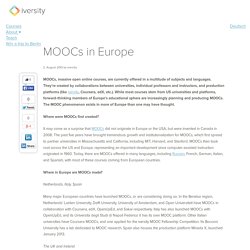
They’re created by collaborations between universities, individual professors and instructors, and production platforms (like iversity, Coursera, edX, etc.). While most courses stem from US universities and platforms, forward-thinking members of Europe’s educational sphere are increasingly planning and producing MOOCs. The MOOC phenomenon exists in more of Europe than one may have thought. Where were MOOCs first created? It may come as a surprise that MOOCs did not originate in Europe or the USA, but were invented in Canada in 2008. Where in Europe are MOOCs made?
Netherlands, Italy, Spain Many major European countries have launched MOOCs, or are considering doing so. The UK and Ireland The United Kingdom also has a new MOOC platform, FutureLearn. Germany. MOOC Around the World, Part 4 - Canadian and American MOOCs. After my long trip through Europe, Australia, India and Latin America on my search for overlooked MOOC platforms, I returned home with luggage full of great experience and tons of information about interesting open classes from around the world.
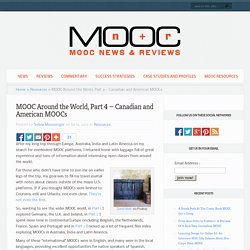
For those who didn’t have time to join me on earlier legs of the trip, my goal was to fill my travel journal with notes about classes outside of the major U.S. platforms. If if you thought MOOCs were limited to Coursera, edX and Udacity, not even close. They’re not even the first. The Best MOOC Provider: A Review of Coursera, Udacity and Edx - SkilledUp.com. Since the MOOC phenomenon took off two years ago, numerous providers have emerged that students might try out, including Canvas and NovoED in the US, Open2Study in Australia, FutureLearn in the UK and iversity in Germany.
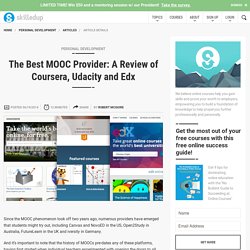
And it’s important to note that the history of MOOCs pre-dates any of these platforms, having first started when individual teachers experimented with opening the doors to all comers. But starting in 2012, three organizations — Udacity, edX and Coursera — started to dominate conversations about MOOCs. These “big three” have the largest catalogs of courses, and they are where most students interested in MOOCs still start their experience. Those three have kept growing — and changing — as they figure out new ways to attract students. For example, all three have made significant changes to their business models.
What does all these changes mean for you, the student? A Comparison of Five Free MOOC Platforms for Educators. By the end of 2013, most top universities had started to offer some sort of MOOC (massive open online course).
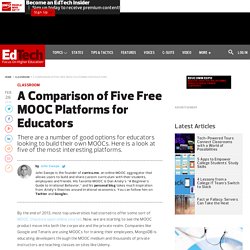
Now, we are starting to see the MOOC product move into both the corporate and the private realm. Companies like Google and Tenaris are using MOOCs for training their employees, MongoDB is educating developers through the MOOC medium and thousands of private instructors are teaching classes on sites like Udemy. If you are considering a MOOC for yourself or your organization, you’ll first need to determine which tool you will use to build the course. The following is an assessment of five popular free MOOC (and MOOC-like) platforms. edX EdX is an open-source platform offered by edX.org. EdX is suitable for organizations that want a modern, flexible, robust course-management platform.
Moodle Moodle is an open-source learning management system (LMS) that allows users to build and offer online courses. Moodle is suited for organizations that want a full-featured, customizable LMS. Communityeflclassroom.com. The Ultimate Guide to MOOCs: Learn For Free Online. Many of the world’s elite Universities are now offering some of their best courses for people to learn free online.
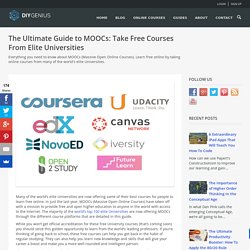
In just the last year, MOOCs (Massive Open Online Courses) have taken off with a mission to provide free and open higher education to anyone in the world with access to the Internet. The majority of the world’s top 100 elite Universities are now offering MOOCs through the different course platforms that are detailed in this guide. While you won’t get official accreditation for these free University courses (that’s coming soon) you should seize this golden opportunity to learn from the world’s leading professors. If you’re thinking of going back to school, these free courses can help you get back in the habit of regular studying. They can also help you learn new knowledge and skills that will give your career a boost and make you a more well-rounded and intelligent person. There are literally thousands of Universities worldwide that are now providing free courses online. 1. MOOCs: technology platforms.
This is the third in our series of posts on MOOCs.
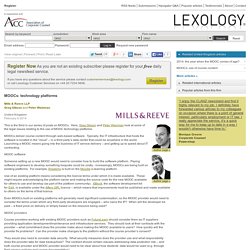
Here, Greg Gibson and Peter Wainman look at some of the legal issues relating to the use of MOOC technology platforms. MOOCs deliver course content through web-based software. Typically, the IT infrastructure that hosts the software is located in the “cloud” – in a third party’s data centre that could be anywhere in the world. Launching a MOOC means going into the business of IT service delivery – and getting up to speed about IT contracting. MOOC software Someone setting up a new MOOC would need to consider how to build the software platform. Use of an existing platform means considering the licence terms under which it is made available. Even MOOCs built on existing platforms will generally need significant customisation, so the MOOC provider would need to consider the terms under which any third party developers are engaged – who owns the IP?